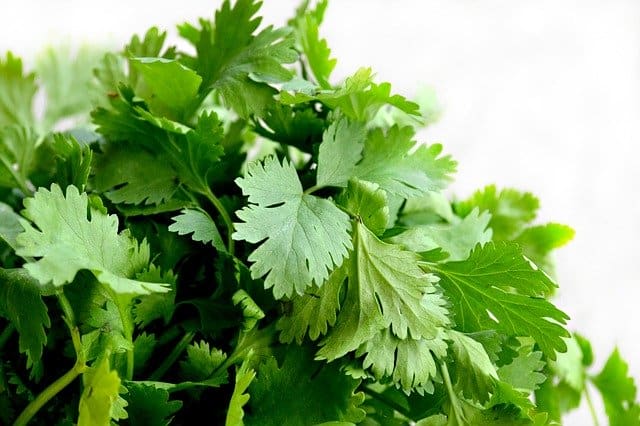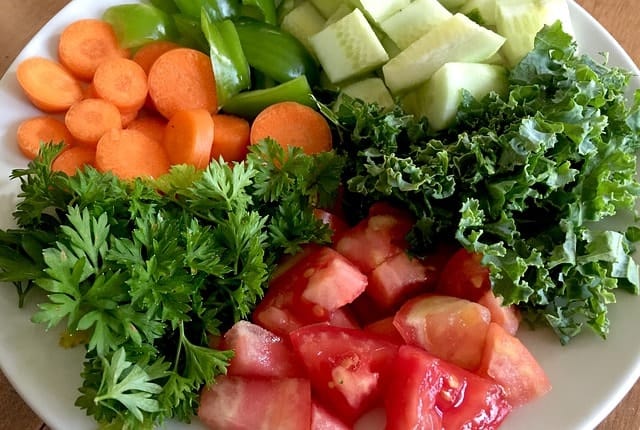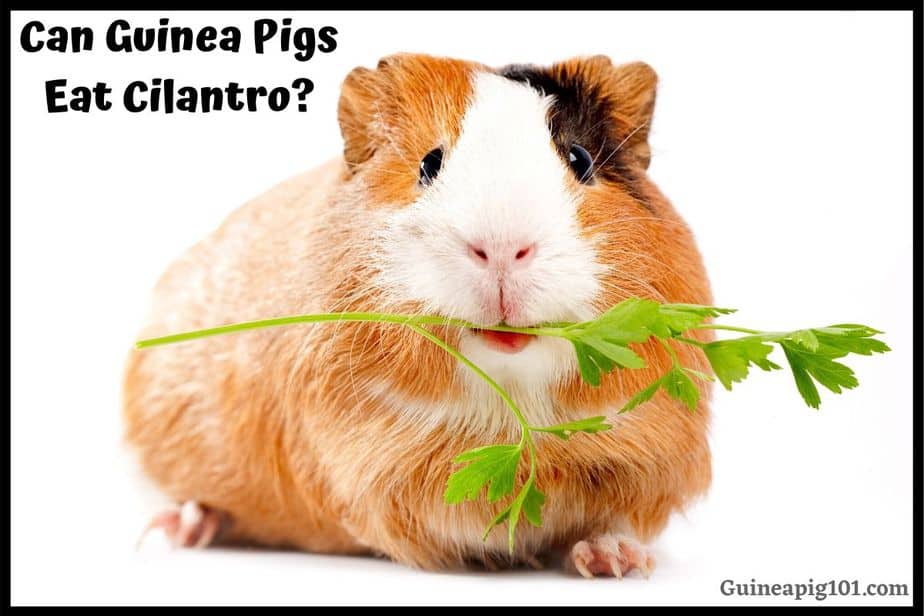Cilantro is refreshing & nutritious herb with zesty taste broadly used all over the world. It is also known as coriander in some parts of the world. Every household use this amazing herb in some form. So, it is obvious that guinea pig owners often wonder if they should share it with their piggies. But can our guinea pigs eat Cilantro?
I did some thorough research to find the facts and here is what I have learned.
Guinea pigs can eat Cilantro. Cilantro is a nutritious herb rich in Vitamin C and antioxidants that you can feed to your guinea pigs. You can almost feed it daily. However, make sure you feed it in moderation to avoid health issues like diarrhea, etc.
Cilantro is also used as a flavoring agent in many of our favorite dishes.
Most of us enjoys eating this green treat that makes our other dishes tastier and representable.
Although you might be surprised to know that there is about 20% of the population that finds its taste resembling soap (bitter taste).
Whatever might be the case, it is a rich source of Vitamin C, which is crucial for our guinea pigs, so we must learn everything about this fantastic herb and feeding it to our guinea pigs.
Before we get into how much Cilantro our guinea pig can eat and how to prepare it for our guinea pigs, let us first take a look at some nutrients that it possesses.
Nutrition in cilantro
| Nutrients | Amount |
|---|---|
| Vitamin C | 27 mg/ 100 g |
| Vitamin K | 310 µg/100 g |
| Vitamin A | 337 µg/ 100 g |
| Carotene | 3930 µg/ 100 g |
| Lutein + Zeaxanthin | 865 µg/ 100 g |
| Calcium | 67 mg/ 100 g |
| Phosphorous | 48 mg/ 100 g |
| Potassium | 521 mg/ 100 g |
| Fiber | 2.8 g/ 100 g |
| Sugar | 0.87 g/ 100 g |
| Magnesium | 26 mg/ 100 g |
| Carbs | 3.67 g/ 100 g |
| Calories | 23 Kcal |
| Fat | 0.52 g/ 100 g |
| Water | 92.21 g/ 100 g |
Cilantro is low in saturated fat and cholesterol, and the caloric value is nearly nonexistent.
It is a good source of dietary fiber, Vitamins A, C, E, K, calcium, iron, potassium, and magnesium, which makes it a fantastic snack for our guinea pigs.
But first, let us have a closer look at some of the nutritional benefits of cilantro.
- Vitamin A: Vitamin A is also crucial for the healthy growth of the body. The function of vitamin A is to promote healthy growth of tissues, improves good eyesight, and also helps in the formation of lots of hormones needed by the body.
- Vitamin C: Vitamin C is an essential nutrient required for the body’s immunity, helps in fighting diseases and promotes overall healthy growth. This vitamin is also responsible for the absorption of iron and other nutrients in the body.
- Vitamin K: Vitamin K helps your body by making proteins for healthy bones and tissues. It also makes proteins for blood clotting.
- Fiber: Cilantro is a good source of dietary fiber. This fiber is a necessary nutrient as it aids our guinea pig digestive system and helps in regular bowel movement in the body. It also helps in maintain glucose and cholesterol levels.
- Potassium, Iron & Magnesium– It is an essential component of cell and body fluids that help regulate heart rate and blood pressure. Iron is necessary for red blood cell production. The human body uses manganese as a cofactor for the antioxidant enzyme, superoxide dismutase.
The herb, including leaves, root, and stem of the cilantro plant, have been found to have antiseptic and carminative properties.
Through the above information, you can see that cilantro or coriander leaves have many benefits, but can it have any side effect on our guinea pig? Let’s have a look.
Is cilantro bad for guinea pigs?

No, cilantro is a fantastic addition to our guinea pig’s diet. However, like any other food moderation is the key to a healthy life.
Cilantro is a healthy snack but always feed them in Moderation. Fun fact about this veggie is that it is beneficial for our cavies and even they enjoy munching it.
This green treat contains Vitamin C in a large portion. Even a small quantity of coriander can be very beneficial for our guinea pigs.
Sometimes an excess of it can cause a digestion problem to our cavies, and even worse, they can develop stones in their stomach as cilantro has a moderate amount of calcium and oxalate in it as well.
Cilantro has chemicals that maintain its freshness for a longer duration. So you can purchase cilantro for a guinea pig, and they can enjoy it for several days.
Cilantro resembles a lot with parsley and comes under top leafy veggie for our guinea pig as well as for us.
Cilantro can be dangerous for pregnant guinea pigs. It can lead to the baby’s bad health and, in the worst case, the mothers. In some cases, the babies, as well as the mother, might pass away. The herbs reduce blood clotting and generate a higher risk of bleeding.
Below are the side effects of feeding excess cilantro to our guinea pigs:
- Digestion problem: Guinea pigs have a sensitive digestive system, and serving too much cilantro can also cause stomach upset and bloating.
- Diarrhea: Guinea pigs have a sympathetic digestive system, and a drastic or frequent change in diet or food can result in diarrhea. Some of them can suffer from severe diarrhea if you feed cilantro in excessive quantities. Thus, make sure you look out for diarrhea and stop feeding it if you see any.
- Irritations: Sometimes cilantro can cause some allergies in our guinea pig, causing rashes and itching. This could irritate guinea pig. So when you newly introduce cilantro to them, watch them, take notes of their diet and how they react to the food.
- Bladder stone: Cilantro has a moderate amount of calcium and oxalate in it. Overfeeding these minerals can lead to sludge and bladder stones in some scenarios.
Are guinea pigs allergic to cilantro?
An allergy to cilantro is very rare to our guinea pigs but can happen when you first introduce the same.
Although it is a good source of nutrients, our cavy’s digestive system is quite weak; therefore, they might find some problems to digest so many nutrients.
They may face some allergies due to cilantro that can lead to some issues such as rashes, itching, and diarrhea.
I would say not to be so much worried about guinea pigs to be allergic to cilantro because, in my experience, I haven’t seen or heard any.
You can also Learn more about guinea pig allergies by reading our in-depth guide.
Are guinea pigs allowed cilantro?
Yes, You are allowed to feed guinea pigs cilantro. In fact, It is highly recommended that you add it to their diet, as it is rich in nutrients that they need the most.
Some of the most common benefits of feeding cilantro to our guinea pigs are:
- Prevention of scurvy: Cilantro has the presence of vitamin C essential for our guinea pig for their excellent health. They need Vitamin C on a daily basis to protect them for diseases and scurvy (a disease caused by the deficiency of vitamin C).
- As they cannot produce vitamin C on their own, so they should regularly get vitamin C from the food they eat.
- Proper growth of body: Cilantro contains a lot of Vitamins and antioxidant agents. These nutrients make them strong and healthy, also keeps their heart in good condition.
- Vitamins like Vitamin K can improve our guinea pig’s bone health and density, keep their teeth healthy, and prevent bones from breaking.
- Minerals like Vitamin A, folate, & phosphorous are needed for the formation of healthy tissues and proper functioning of all the body organs.
- Repair tissue: Cilantro also has the presence of Vitamin A & C that helps build new tissue and repair tissue, it is also necessary for an immune system’s function.
- Improvement of eyesight: Cilantro also contains Vitamin A that improves the sight of our cavies. It also promotes good vision.
- Prevention from any health issues: The antioxidants and minerals present in cilantro help in preventing many diseases.
- Antioxidants help to reduce the effect of oxidative stress.
- Having a low sugar level can maintain our guinea pigs from over-weighting. Lowering the risk of obesity. It can also prevent food poisoning.
- Manganese in cilantro can prevent painful kidney stones or bladder stones.
- Lower cholesterol: Cholesterol level is maintained well due to the presence of dietary fiber. This also helps to bring down the chances of heart failure and diseases.
- Boosting up the immune system & energy level: The vitamins and minerals present in cilantro are necessary to develop a healthy and robust immune system in our guinea pigs.
- It also helps in harmful detoxifying fluids.
- If they have been recently sick so you can provide them cilantro and boost up their every level.
How often can guinea pigs eat cilantro?
You can feed cilantro almost daily to your guinea pigs. Do remember that you should only include a small portion of it.
Most guinea pigs enjoy this herb. Most of them respond quite well as they like munching the leaves.
However, some of them might show allergic reaction if you are introducing it for the first time.
Remember when you are introducing something new to them, and have a routine check on their reaction to the element with gradual approaches.
Can guinea pigs eat cilantro every day?
Yes, guinea pigs can eat cilantro almost daily.
However, it is recommended that you give a break every once in a while and switch it with something else.
This helps to spice up the diet of your guinea pigs.
How much cilantro can guinea pigs eat?

Normally adult guinea pigs can eat 10-20 small sprig of cilantro, and a baby guinea pig can eat none.
Our guinea pigs have a small stomach with weak digestion, so try feeding them in small quantities.
Whenever you newly introduce cilantro to them, take them in observation of twelve hours if you see any sign of discomfort or diarrhea take cilantro out of the menu.
It is also recommended to mix it with other low calcium veggies like lettuce, bell peppers, cucumber, zucchini, carrots, etc. to create a healthy and balanced diet for your guinea pigs.
You can make a healthy mix of vegetables and serve it in a bowl.
Can guinea pigs eat cilantro stems
Yes, guinea pigs can have cilantro stems with no problems at all.
A surprising fact about cilantro is that all of its parts are edible.
That means every portion of cilantro is suitable for feeding them, such as leaves, stem, and flower parts.
One better thing is that our little furry buddy likes to have something inside their mouth all time.
Always remember to wash cilantro very well before you present it to the guinea pig.
The stems are as safe as the leafy parts. Some stem surfaces can be rough, so whenever you give them a cilantro stem, chop it into small pieces. This makes it easier for them to much on it.
You can also provide them with other safe tree branches like apple, willow, birch, etc.
Can guinea pigs eat cilantro flowers
As I have mentioned above that all of its parts are edible, which includes floral elements too. So, you can definitely throw in some cilantro flowers into your guinea pig’s diet.
Floral parts are quiet attractive than any other part of cilantro. There is no harm in feeding cilantro flowers to a guinea pig.
Always feed them after washing the cilantro. Please do not give them a large portion of it as they small tummy, too much of it can cause diarrhea.
Green parts are more beneficial than floral elements, as seen from the nutritional aspect.
Can guinea pigs eat cilantro roots
No, guinea pigs cannot eat roots of cilantro.
Earlier I said all of its parts are edible, but it does not include cilantro roots.
Always separate the root part as it does not have any benefits for our guinea pigs.
Now you know all the necessary details about cilantro, but the crucial section remains how to prepare our cilantro for our guinea pigs. Let’s see how.
How to prepare cilantro for our guinea pigs?

As you are known, Cilantro is one of the best green treats you would be feeding your guinea pig. Before you feed guinea pig cilantro, preparation is a must and has to be conducted correctly. Feeding cilantro is just as easy as any other vegetables. Following are the steps mentioned:
- The first step is to choose the fresh Cilantro that readily available in the market.
- The second step is you have clean the veggie with water to take out the grime.
- After that, don’t wait for Cilantro to be dry. Little water on Cilantro will keep our guinea pigs body hydrated.
- Chop the Cilantro into medium pieces, including the stem, and then feed it to your guinea pigs.
- You can either hand-feed them or put them in a bowl. Serve; however, you like it.
- The final step is to remove the leftovers. Uneaten pieces of food can attract rats and flies, which can threaten your guinea pig.
Well, that’s what you do, a simple and easy process of preparation. By following the above steps, our guinea pig can have an alluring and healthy appetizer.
Conclusion: Guinea pigs and Cilantro
- Cilantro is a rich source of nutrients such as vitamins A, C, & K, and many more beneficial nutrients. It is one of the best herbs that you can feed your guinea pig.
- You can feed cilantro 4-5 times a week or spoil your guinea pig by giving them a small portion almost daily. You can provide a handy amount of cilantro with other snacks to avoid food poisoning.
- Clean the cilantro by washing it with water, cut the cilantro into small pieces along with its stem. Also, never feed them roots of cilantro to your guinea pigs.
- It comes along with lots of benefits; still, it can have some side effects as too much of everything is terrible.
- Whenever you newly introduce cilantro to your guinea pig, have them under the observations of 12 hours, take notes of their diet and reaction. They will undoubtedly enjoy munching the leaves, so there is nothing to worry about.
- This veggie comes under the staple diet part of our guinea pig as it contains Vitamin C that is essential for our guinea pig.
Sources: Everything you need to know about cilantro, Nutrition in cilantro, Diet Composition and Mineral Balance in Guinea Pigs, Dietary Vitamin C, and Vitamin E on Guinea Pig Immune Responses to Mitogens, Vitamin C requirements of the guinea-pig, Is Your Guinea Pig’s Diet Providing the Right Nutrients? Care of Guinea Pigs.
Similar Posts:
- Can Guinea Pigs Eat Dandelions? (Hazards, Serving Size & More)
- Can Guinea Pigs Eat Parsley? (Hazards, Serving size & More)
- Can Guinea Pigs Eat Dill? (Hazards, Serving Size & More)
- Can Guinea Pigs Eat Swiss Chard? (Hazard, Serving Size & More)
- What Fruits Can Guinea Pigs Eat? (Fruit List, Serving Size & More)
